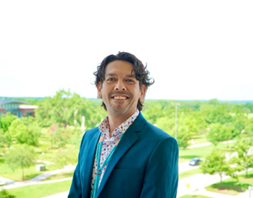Indigenous Scholars In Residence Program
The Indigenous Scholars in Residence Program facilitates the development of a more holistic understanding of modern and past Indigenous cultures, trust relations, Indigenous perspectives and interpretations in the disciplines of archaeology, anthropology, education, and American Indian studies.
How It Works:
Scholars reside on Crow Canyon’s campus for six nights with the purpose of supplementing cultural knowledge, perspectives, and insights to existing curricula for student and adult participants from across the nation. Scholars participate in field and laboratory activities, classroom teaching (indoor and outdoor), evening program delivery, and brown-bag lunch seminars during the designated program week to facilitate direct interactions with students. Collaborating with staff, scholars develop any additional curricula activities that enhance program delivery and experiential learning—such as field trips, home/community visits, demonstrations, service learning projects, etc.
Crow Canyon offers scholars housing in a modern home, consisting of a living room, kitchen, two bedrooms, bath, and a private, enclosed yard. Access to a computer and Internet service are included and Crow Canyon will pay utilities. Breakfast, lunch, and dinner will be provided from Sunday night through Saturday morning. Additionally, a travel stipend of up to $300.00 (with receipts) and honorarium of $1,650 ($275.00 per day for six days) will be awarded.
2024 Indigenous Scholars in Residence
 June 2–8, 2024
June 2–8, 2024
Dr. Justin Lund, Ph.D. (Diné) (he/him/his), serves as a post-doctoral scholar within the Department of Anthropology at Northern Arizona University (NAU). He holds master’s and doctoral degrees from the University of Oklahoma. Dr. Lund’s expertise lies in molecular anthropology, with a primary research focus on human microbiomes, bioethics, and Indigenous methodologies. However, his overarching commitment lies in amplifying Native American narratives and advancing Tribal sovereignty. At NAU, Dr. Lund spearheads the establishment of the Indigenous Molecular Anthropology Laboratories. These pioneering labs are designed to center Indigenous perspectives and foster community collaboration as the cornerstone of research methodology. The ultimate aim is to cultivate meaningful research partnerships while simultaneously mentoring the next generation of Indigenous genomics professionals.
 June 9–15, 2024
June 9–15, 2024
Deloria Lomawaima (Hopi) was born and raised on the Third Mesa village of Lower Moencopi. Her education includes attending Fort Lewis College, Northern Arizona University (NAU), and the University of Phoenix. She obtained an undergraduate degree from NAU with a major in Applied Indigenous Studies with a focus on Cultural Resource Management and received her M.A.Ed from the University of Phoenix. She has continuously been interested in the history of her Hopi people, more recently focusing on the genealogy of her own family. Deloria currently resides and works within her village as the elementary school librarian. Her hobbies and interests include taking hikes with her family, sewing, and running.
 June 23–29, 2024
June 23–29, 2024
Dr. Wade Campbell (Diné) is an Assistant Professor of Archaeology and Anthropology at Boston University. His research explores the historical relationships between Diné communities
and other local groups in the U.S. Southwest, including the Pueblos, Spanish, and Americans. In particular, Campbell’s work examines longer-term patterns of Diné settlement and economic
activity across the greater Four Corners region, with a particular focus on the origins of the Diné sheepherding tradition and related shifts in land use, social organization, and diet and subsistence practices between A.D. 1600 and the present day.
